(完整版)二月二龙抬头(中英双语)
二月二龙抬头双语学习

二月二龙抬头双语学习农历第2个月的第2天是中国传统节日--龙抬头节,也称春龙节或二月二节。
The traditional Chinese festival----Dragon Heads-raising Day (or Spring Dragon Festival or Eryueer Festival) falls on the second day of the second month in the Chinese lunarcalendar.在中国传统文化中,龙被奉为万物之王、人类的始祖。
龙也被认作是古代农业文化的重要元素之一——掌管降雨之神。
In the traditional Chinese culture, the dragon is believed to be the king of all creatures and the ancestor for human being. It is also regarded as the deity in charge of rain, an important factor in ancient agriculture.习俗Customs根据民间传说,农历二月初二是掌管云雨的龙王抬头之日。
过了龙抬头这天,雨水充沛,所以这天被称为春龙界。
过去,在中国北方农村大部分地区,在春龙节当天,家家户户一大早都会打着灯笼到井边或河边挑水。
回到家里便点灯、烧香、上供,理发。
人们把这种仪式叫做“引田龙”。
这一天,家家户户还要吃面条、炸油糕、爆玉米花(比作为“挑龙头”、“吃龙胆”、“金豆开花,龙王升天,兴云布雨,五谷丰登”),以示吉庆。
According to the folk legend, the 2nd day of the second lunar month is the very day for the Dragon king who is in charge of clouds and rains to raise his head. After that day, there will be abundant rain, so the day is also called Spring Dragon Day.On that day, many farmers in North China would carry the lanterns to fetch water from the wells and the rivers early in the morning, and then They would light the candles, burn incense and pay tribute to the Dragon King and have their hair cut. This ceremony was called “welcoming the fields dragon”.On that day, all the families would eat noodles or fried glutinous rice blocks and pop corn as part of the festivity to enjoy happiness.古时候,人们还会熏香以驱赶家里的味道,以确保春天到来后,家里有着新鲜芳香的空气以及满满的好运。
关于龙抬头的古诗英文

(Dragon Raises Its Head) is a traditional Chinese festival 庆祝农历二月初二, which marks the end of winter and the beginning of spring. It is also a time when people believe that the dragon, a symbol of power and good luck in Chinese culture, raises its head from the waters to bring rain and prosperity.Here is an English translation of a classic Chinese poem庆祝龙抬头:Title: On the Dragon Raises Its HeadOn the second day of the second lunar month, The dragon raises its head with might and grandeur. The clouds part, the sun shines bright, And the earth starts to bloom with newfound energy.The dragon dances in the sky, Coiling and uncoiling with ease. Its scales glint in the sunlight, As if coating the world in a layer of gold.People cheer and rejoice, Offering incense and prayers to the dragon king. Hoping for a bountiful year, With rain and sunshine in perfect harmony.The dragon's power and might, Bring prosperity and success. May we all be blessed, By the dragon's presence this day. Note: This is a poetic translation of the festival, and may not reflect the exact words or phrases used in traditional Chinese poems. The aim is to capture the essence and sentiment of the festival while maintaining the rhythm and flow of poetry.。
二月二龙抬头相关风俗习俗英语翻译
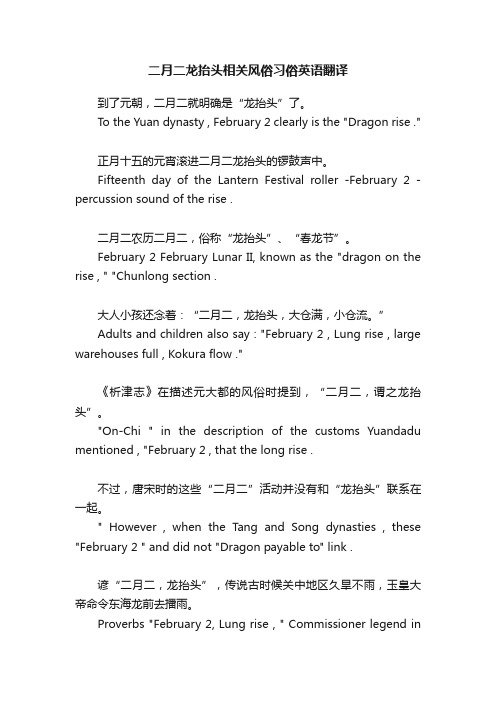
二月二龙抬头相关风俗习俗英语翻译到了元朝,二月二就明确是“龙抬头”了。
To the Yuan dynasty , February 2 clearly is the "Dragon rise ."正月十五的元宵滚进二月二龙抬头的锣鼓声中。
Fifteenth day of the Lantern Festival roller -February 2 -percussion sound of the rise .二月二农历二月二,俗称“龙抬头”、“春龙节”。
February 2 February Lunar II, known as the "dragon on the rise , " "Chunlong section .大人小孩还念着:“二月二,龙抬头,大仓满,小仓流。
”Adults and children also say : "February 2 , Lung rise , large warehouses full , Kokura flow ."《析津志》在描述元大都的风俗时提到,“二月二,谓之龙抬头”。
"On-Chi " in the description of the customs Yuandadu mentioned , "February 2 , that the long rise .不过,唐宋时的这些“二月二”活动并没有和“龙抬头”联系在一起。
" However , when the Tang and Song dynasties , these "February 2 " and did not "Dragon payable to" link .谚“二月二,龙抬头”,传说古时候关中地区久旱不雨,玉皇大帝命令东海龙前去播雨。
二月二龙抬头的风俗英语作文

二月二龙抬头的风俗英语作文【中英文版】英文版:The Custom of "Dragon Raising Its Head" on the Second Day of the Second MonthIn China, there is a traditional custom called "Dragon Raising Its Head" celebrated on the second day of the second month of the Chinese calendar.This day is also known as "Tuan Tou" or "Dragon Head Raising Day." It is an important festival in China, symbolizing the coming of spring and the awakening of nature from its winter slumber.The custom of "Dragon Raising Its Head" has a long history and holds great significance.According to legend, the dragon is a symbol of power, wisdom, and good fortune.On this day, people believe that the dragon, representing the Chinese nation, will raise its head and bring blessings and prosperity to the country and its people.To celebrate this festival, people in China engage in various activities.One of the most common traditions is to get a haircut.It is believed that cutting hair on this day will bring good luck and promote healthy growth.Many parents take their children to get their hair cut, hoping to ensure their children"s growth and well-being in the coming year.Another popular custom is to eat "Nian Gao," a type of sticky ricecake.The name "Nian Gao" translates to "year cake," symbolizing the hope for a better and more prosperous year ahead.Eating this cake is believed to bring unity, harmony, and happiness to families.Dragon dances are also performed in many communities to celebrate the festival.The dragon dance is a traditional Chinese dance that involves a long, coiled dragon, which is typically performed by a group of dancers.The dance symbolizes the awakening of the dragon and the arrival of spring.In conclusion, the custom of "Dragon Raising Its Head" on the second day of the second month is an important traditional festival in China.It symbolizes the coming of spring and the awakening of nature.Through various activities such as getting haircuts, eating "Nian Gao," and performing dragon dances, people in China celebrate this festival, hoping to bring good luck, prosperity, and happiness to themselves and their families.中文版:二月初二龙抬头的风俗在中国,有一个传统习俗称为“龙抬头”,在农历二月初二这一天庆祝。
龙抬头英文翻译

龙抬头英文翻译
今天是农历二月二,是“龙抬头”(Dragon Head-raising Day)的日子,又被称为"春耕节"、"农事节"、"春龙节",是中国民间传统节日。
“龙”是指二十八宿中的东方苍龙七宿星象,每到仲春卯月之初,“龙角星”就从东方地平线上升起,故称“龙抬头”。
“龙抬头”是中国古代农耕文化对于节令的反映,标示着阳气自地底而出,雨水增多、气温回升,万物生机盎然,春耕由此开始。
龙在中国是祥瑞之物,主宰和风化雨。
所以二月二要敬龙祈雨,盼一年到头能有好收成。
There is a widely known idiomatic phrase which goes,"On the second day of the second month of the lunar calendar, the dragon raises his head" (二月二,龙抬头).
In China,the dragon, besides for its connotations for good luck and supreme power, is also the god managing weather and water.
So Dragon Head-raising Day is about honoring the Chinese dragon and praying for good weather in spring, the key time for plowing the fields.。
二月二龙抬头的英语

二月二龙抬头的英语英文回答:February 2nd, also known as Dragon-Raising Day (LóngTái Tóu), is a traditional Chinese festival celebrated on the second day of the second lunar month. It marks the awakening of the mythical dragon from its winter slumber and the start of spring.The festival is believed to have originated during the Han Dynasty (206 BCE 220 CE) when people worshipped a dragon deity called Blue Dragon (Qing Long). They believed that the dragon controlled the weather and brought rain, so they prayed to it for a good harvest.Over time, Dragon-Raising Day became associated with the dragon's mythical power and symbolism. The dragon is a powerful and auspicious creature often associated with good fortune, strength, and prosperity. On this day, people celebrate the dragon's awakening and ask for its blessings.Traditionally, Dragon-Raising Day is marked by various customs and activities. One common practice is to make paper or cloth dragons and parade them through the streets. People also eat special foods such as dumplings and noodles that resemble dragons.Another common activity is to shave one's head and wash one's hair on this day. This symbolizes removing bad luck and welcoming good fortune. Other activities include offering sacrifices to the dragon god, burning incense, and setting off firecrackers.In modern times, Dragon-Raising Day is still celebrated in many Chinese communities. However, the festival's traditions and practices may vary depending on the region.中文回答:二月二,中国俗称"龙抬头",是农历二月二日的传统节日,标志着春回大地,万物复苏。
二月二龙抬头(中英双语)
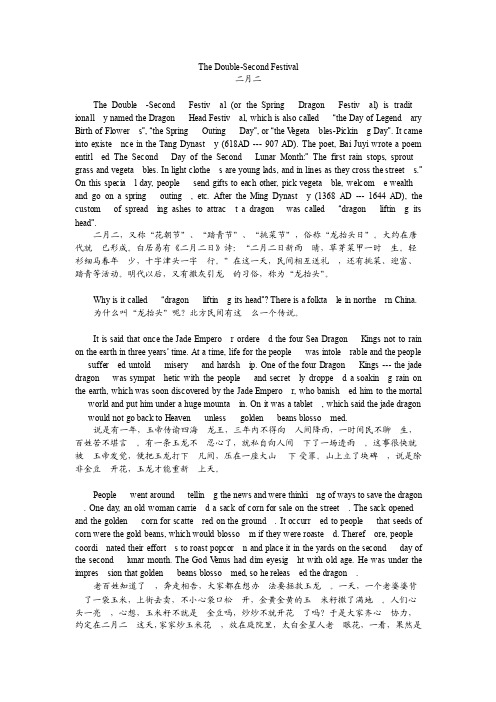
The Double-SecondFestiva l二月二The Double-SecondFestival (or the SpringDragonFestival) is traditionally named the DragonHead Festival, which is also called“the Day of Legendary Birth of Flowers”, “the SpringOutingDay”, or “the V egetables-Picking Day”. It came into existence in the Tang Dynasty (618AD --- 907 AD). The poet, Bai Juyi wrote a poem entitled The SecondDay of the SecondLunar Month:”The first rain stops, sproutgrass and vegetables. In light clothes are young lads, and in lines as they cross the streets.”On this special day, peoplesend gifts to each other, pick vegetable, welcom e wealthand go on a springouting, etc. After the Ming Dynasty (1368 AD --- 1644 AD), the customof spreading ashes to attract a dragonwas called“dragonlifting its head”.二月二,又称“花朝节”、“踏青节”、“挑菜节”,俗称“龙抬头日”。
二月二,龙抬头英语作文

二月二,龙抬头英语作文英文回答:Introduction.Dragon Head-Lifting Festival is a traditional Chinese holiday celebrated on the second day of the second lunar month, usually occurring in late February or early March. The festival marks the end of the hibernation period for dragons, and symbolizes the beginning of spring and new life. It is also a day to pray for good luck, prosperity, and a bountiful harvest.Origin and Legend.The festival's roots can be traced back to ancient Chinese myths and legends. According to one legend, there was a powerful celestial dragon named Chenhuo who controlled the weather and brought rain to the land. However, one year, Chenhuo slept past his alarm and missedthe time to send down rain. As a result, crops withered and the people suffered from severe drought.To wake Chenhuo from his slumber, the God of Thunder used his drums to create loud noises. The villagers also beat drums, gongs, and other instruments to make as much noise as possible. Finally, Chenhuo awoke and lifted his head to the sky, releasing torrential rain that saved the crops and brought relief to the land.Customs and Traditions.Dragon Head-Lifting Festival is celebrated with a variety of customs and traditions. These include:Eating Dragon-Shaped Food: People eat foods shapedlike dragons, such as fried dough twists, dumplings, and noodles, to symbolize the awakening of the dragon and to bring good luck.Cutting Dragon Tails: Children cut pieces of paper or fabric into dragon tails and attach them to trees or poles,symbolizing the dragon's shedding of its winter coat.Raising Dragon's Head: People lift their heads or toss their hair in the air to imitate the dragon's movement and to encourage growth.Blessing Children: Parents often take their children to barbers on this day to get their first haircuts, which is believed to bring health and longevity.Praying for Good Fortune: People visit temples oroffer prayers at home, asking for blessings of good luck, prosperity, and a successful year.Significance.Dragon Head-Lifting Festival is a significant cultural event in China. It marks the transition from winter to spring and symbolizes renewal, growth, and good fortune. The festival reminds people of the importance of perseverance, diligence, and the interconnectedness of all living things.中文回答:导言。
二月二龙抬头英语作文初中

二月二龙抬头英语作文初中English: In China, the "Dragon Heads-raising Day" is celebrated on the second day of the second lunar month, which is believed to mark the awakening of the dragons and the beginning of spring. This day is considered an auspicious time for people to start new ventures, make important decisions, and pray for good fortune. The celebration often includes dragon dances, offering sacrifices to the dragons, eating certain foods like dragon-shaped dumplings, and hanging up red decorations to ward off evil spirits and bring good luck. It is a time for families to come together and pay their respects to the dragon, as well as to wish for prosperity and happiness in the coming year.中文翻译: 在中国,二月二有一个传统节日叫做“龙抬头”,这个节日在农历二月二日,据说这一天标志着龙的苏醒和春天的开始。
这一天被认为是一个吉利的时刻,人们可以开始新的冒险,做重要的决定,为了好运祈祷。
庆祝活动通常包括舞龙,给龙祭品,吃一些特定的食物,像龙形饺子,还有挂红色的装饰品来驱逐邪灵,带来好运。
中英双语阅读素材 二月二龙抬头习俗的英文表达,传播中华传统文化

二月二龙抬头习俗的英文表达,传播中华传统文化自古就有这样的说法:“二月二,龙抬头,大仓满,小仓流”可见,这一天对中国人来说是非常重要的“龙抬头”英语怎么说?“龙抬头”英语怎么说?“龙抬头”其实是个节日所以“龙抬头”可以说Longtaitou Festival维基百科:Longtaitou FestivalThe Longtaitou Festival, is a traditional Chinese festival held on the second day of the second month of the Chinese calendar. Its name means "Dragon raising its head"because the dragon was regarded as the deity in charge of rain, an important factor in ancient agriculture. The festival is sometimes simply called "2 Month 2" for short.龙抬头,是中国的传统节日,在中国农历的第二个月的第二天。
它的名字意为龙抬起它的头,因为龙被视为掌管雨的神而在古代农业生活中有重要的作用。
这个节日有时简单地称为二月二。
那如果这么说,老外听不懂可以这样解释↓Dragon Head-Raising Day龙抬头为什么二月二要理发?The story goes that after this day, the Dragon King would wake from his winter sleep and bring rainfall for the crops. The Chinese saying ‘Er r yew err, long tai too,’ which translates to ‘On the second day of the second month, the dragon lifts its head,’ celebrates the ancient agrarian culture in China. Although some of the traditions to celebrate the day are no longer practiced, some do remain.传说从这一天起,龙王会从冬眠中醒来,为庄稼带来降雨。
2月2龙抬头英语小学作文

2月2龙抬头英语小学作文In the heart of February, a tradition as old as time awakens. It's the day of the Dragon's Head-lifting, afestival celebrated with great enthusiasm.This day is not just a marker on the calendar, but a symbol of the awakening of life and the beginning of spring's warm embrace. As the cold of winter recedes, the dragon, a revered creature in our culture, is said to rise, bringing prosperity and good fortune.Children in schools are taught the significance of this day, and we eagerly participate in various activities. We make dragon-shaped crafts, dance to the rhythm of drums, and enjoy traditional foods that symbolize growth and strength.In our homes, the atmosphere is filled with joy and hope. Families gather to make dumplings, which resemble the scales of a dragon, and noodles, which represent its long, flowing body. It's a feast that not only satisfies our taste buds but also connects us to our rich heritage.The Dragon Boat Festival, though distinct, shares a similar spirit with the Dragon's Head-lifting Day. Both are times for unity and celebration, reminding us of our shared history and the power of community.As the sun sets on this special day, we look to the sky,imagining the dragon soaring high, its scales glistening in the light. It's a sight that fills us with awe and a sense of belonging to a culture that values harmony with nature.In classrooms, stories are shared of the dragon's wisdom and its role in bringing rain for the crops. We learn that just as the dragon brings life to the fields, we too can contribute to our world's prosperity.This festival is more than just a celebration; it's a reminder of our cultural roots and the importance of embracing change with hope and optimism. As we look forward to the rest of the year, the spirit of the dragon inspires us to rise to new heights.。
龙抬头 中译英

Dragon Heads-raising Day
龙抬头日二月二日,这是个传统的节日。在帝国资本主 义(君主专制)的时代时,清代的潘荣陛就这样写道: 第二天是龙抬头的日子。
袭击; 落到,轮到
Dragon Heads-raising Day falls on the second day
of the lunar month, which is a traditional festival.
这一天村民们会铺一条小路进入房子,然后绕着水缸再
走到外面。这就是所谓的请龙回屋。人们会在都城里用 炒糜子粉,小麦蛋糕,和其他的东西作为食物。期望着 丰收。
wind n.风; 气流; 吞下气; 管乐器; vt.蜿蜒; 缠绕; 上发条; adj.管乐的; 铺路 make a path
On the day, villagers made an ash path into the houses , then wind around the water vats from the outside. This is called leading the dragons back to houses. People in the capital city fry broomcorn millet flour, cakes made of wheat flour , and other things as their food. Looking forward to harvest.
Contingent adj.依情况而定的; 取决于…; n.分遣队; 代表团; Parade v.游行; 展览; 招摇过市; 接受检阅; n.检阅; 游行; 一系列; 炫耀;
Everywhere contingent of parade passed,people
关于龙抬头的英语作文
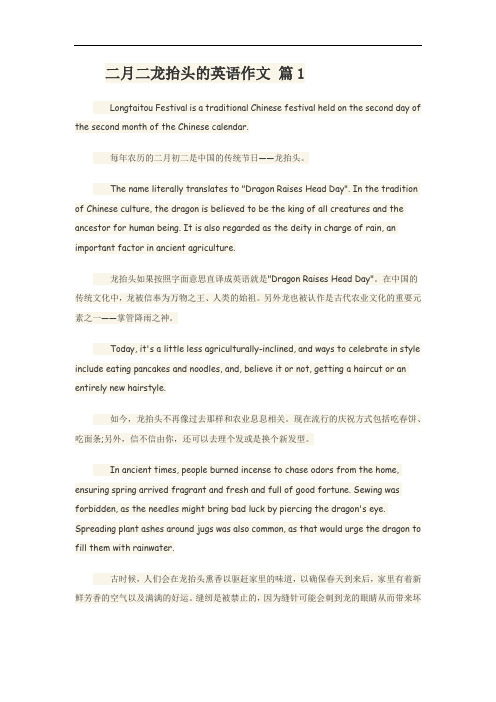
二月二龙抬头的英语作文篇1Longtaitou Festival is a traditional Chinese festival held on the second day of the second month of the Chinese calendar.每年农历的二月初二是中国的传统节日——龙抬头。
The name literally translates to "Dragon Raises Head Day". In the tradition of Chinese culture, the dragon is believed to be the king of all creatures and the ancestor for human being. It is also regarded as the deity in charge of rain, an important factor in ancient agriculture.龙抬头如果按照字面意思直译成英语就是"Dragon Raises Head Day"。
在中国的传统文化中,龙被信奉为万物之王、人类的始祖。
另外龙也被认作是古代农业文化的重要元素之一——掌管降雨之神。
Today, it's a little less agriculturally-inclined, and ways to celebrate in style include eating pancakes and noodles, and, believe it or not, getting a haircut or an entirely new hairstyle.如今,龙抬头不再像过去那样和农业息息相关。
现在流行的庆祝方式包括吃春饼、吃面条;另外,信不信由你,还可以去理个发或是换个新发型。
二月二,龙抬头英语作文
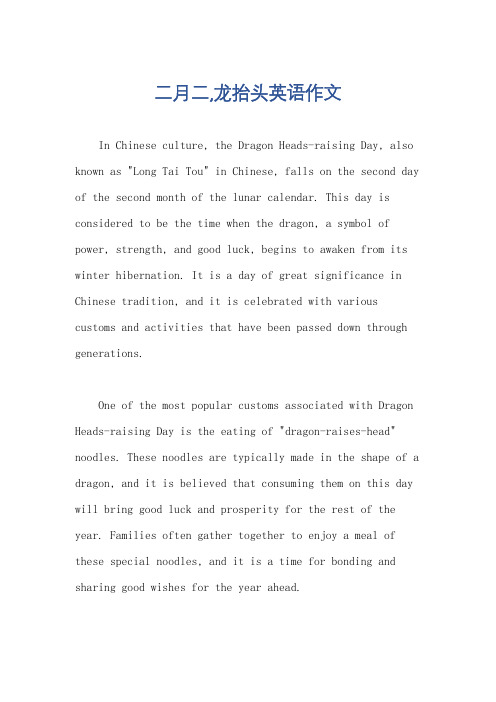
二月二,龙抬头英语作文In Chinese culture, the Dragon Heads-raising Day, also known as "Long Tai Tou" in Chinese, falls on the second day of the second month of the lunar calendar. This day is considered to be the time when the dragon, a symbol of power, strength, and good luck, begins to awaken from its winter hibernation. It is a day of great significance in Chinese tradition, and it is celebrated with various customs and activities that have been passed down through generations.One of the most popular customs associated with Dragon Heads-raising Day is the eating of "dragon-raises-head" noodles. These noodles are typically made in the shape of a dragon, and it is believed that consuming them on this day will bring good luck and prosperity for the rest of the year. Families often gather together to enjoy a meal of these special noodles, and it is a time for bonding and sharing good wishes for the year ahead.Another common practice on Dragon Heads-raising Day is the flying of kites. It is believed that flying a kite on this day will bring good luck and drive away evil spirits. People of all ages can be seen flying kites in open spaces, such as parks or fields, and it is a joyful sight to witness the colorful kites soaring high in the sky. This tradition not only brings people together but also symbolizes the hope for a bright and prosperous future.In addition to these customs, there are also various folk activities and performances that take place on Dragon Heads-raising Day. Dragon dances, in particular, are a common sight during this time. The dragon, typically made of colorful fabric and held up by a team of dancers, weaves and dances through the streets, accompanied by the sounds of drums and cymbals. This lively and energetic performance is not only a form of entertainment but also a way to bring good fortune and blessings to the community.Furthermore, Dragon Heads-raising Day is also a timefor people to pay their respects to the dragon, which is considered a divine creature in Chinese mythology.Offerings of food, incense, and other symbolic items are made at temples and shrines, as a way to honor and show gratitude to the dragon for its protection and blessings. This act of reverence reflects the deep-rooted belief inthe power and significance of the dragon in Chinese culture.Moreover, the significance of Dragon Heads-raising Day extends beyond its traditional customs and activities. Itis a time for people to reflect on the importance of preserving and passing down their cultural heritage tofuture generations. Through the celebration of this day, young people can learn about the values and beliefs that have shaped their culture, and the importance of honoring and embracing these traditions. It serves as a reminder of the rich and vibrant tapestry of Chinese culture, and the need to continue cherishing and upholding it for years to come.In conclusion, Dragon Heads-raising Day is a time-honored tradition that holds great cultural and spiritual significance in Chinese society. It is a day of celebration, reflection, and unity, as people come together to partakein customs and activities that have been cherished for centuries. Through these practices, the dragon, a symbol of strength and good fortune, is revered and honored, bringing blessings and hope for the year ahead. It is a time to embrace and preserve the rich cultural heritage that has been passed down through generations, and to ensure that it continues to thrive in the modern world. As the dragon raises its head on this auspicious day, it symbolizes the awakening of tradition, the renewal of hope, and the enduring spirit of the Chinese people.。
二月二龙抬头英语作文
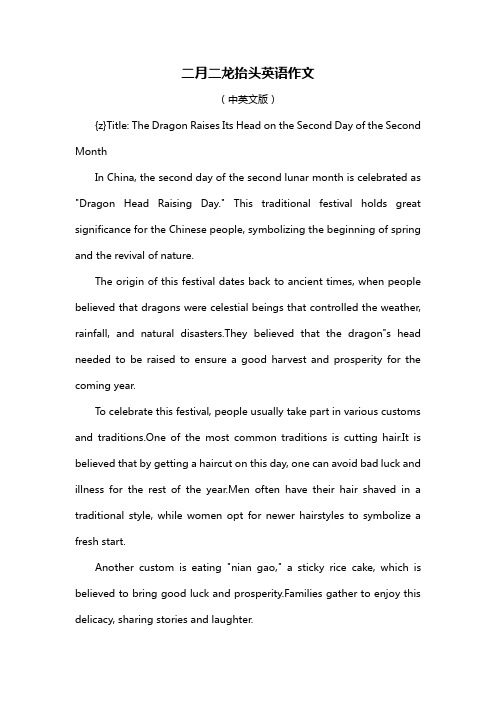
二月二龙抬头英语作文(中英文版){z}Title: The Dragon Raises Its Head on the Second Day of the Second MonthIn China, the second day of the second lunar month is celebrated as "Dragon Head Raising Day." This traditional festival holds great significance for the Chinese people, symbolizing the beginning of spring and the revival of nature.The origin of this festival dates back to ancient times, when people believed that dragons were celestial beings that controlled the weather, rainfall, and natural disasters.They believed that the dragon"s head needed to be raised to ensure a good harvest and prosperity for the coming year.To celebrate this festival, people usually take part in various customs and traditions.One of the most common traditions is cutting hair.It is believed that by getting a haircut on this day, one can avoid bad luck and illness for the rest of the year.Men often have their hair shaved in a traditional style, while women opt for newer hairstyles to symbolize a fresh start.Another custom is eating "nian gao," a sticky rice cake, which is believed to bring good luck and prosperity.Families gather to enjoy this delicacy, sharing stories and laughter.Dragon Head Raising Day is also a time for people to pay respect to their ancestors.Families visit graves and offer food, flowers, and incense to honor their departed loved ones.In addition to these customs, Dragon Head Raising Day is an excellent opportunity for people to enjoy themselves and participate in various activities.Parades, dragon and lion dances, and traditional music performances are common sights in many cities and towns.Overall, Dragon Head Raising Day is a significant festival in China that signifies the arrival of spring and the hope for a prosperous year ahead.It brings people together to celebrate, enjoy traditional customs, and honor their ancestors.。
2月2龙抬头英语作文

2月2龙抬头英语作文February 2nd is an important day in Chinese culture, known as Long Tai Touor Dragon Raising its Head. It is believed that on this day, the dragon wakes up from its hibernation and brings good luck and fortune. As a language model, I may not have emotions, but I understand the significanceof this day and its cultural importance. In this essay, I will discuss the history and traditions associated with Long Tai Tou, its significance in Chinese culture, and how it is celebrated.Long Tai Tou has its roots in ancient Chinese mythology. According to legend, the dragon is the ruler of the water, and during the winter months, it hibernates in the water. On the second day of the second lunar month,the dragon awakens from its slumber and raises its head to survey the world. This event marks the beginning of spring and is seen as a sign of good luck and fortune.The significance of Long Tai Tou in Chinese culture is immense. The dragonis considered a symbol of power, strength, and good luck. It is believedthat if one sees a dragon on this day, they will have good luck for therest of the year. Many people also believe that the dragon has the power to bring rain, which is essential for agriculture and a good harvest.In China, Long Tai Tou is celebrated in various ways. One of the most popular traditions is to eat noodles, which are believed to bring longevity and good luck. The noodles are often served in a bowl with a pair of chopsticks, symbolizing a long life. Another tradition is to hang red lanterns and banners with auspicious phrases such as '福' (fu) meaning good fortune, '寿' (shou) meaning longevity, and '财' (cai) meaning wealth.In some parts of China, people also perform dragon dances to celebrate Long Tai Tou. The dragon dance is a traditional Chinese dance performed during festivals and celebrations. It involves a team of dancers holding a long dragon made of paper or cloth. The dancers move the dragon in a serpentinemotion, accompanied by the sound of drums and cymbals. The dragon dance is believed to bring good luck and fortune.Long Tai Tou is not only celebrated in China but also in other parts of the world with significant Chinese populations. In Singapore, for example, the Chinese community celebrates Long Tai Tou by visiting temples, offering prayers, and eating traditional foods. In other countries such as Malaysia and Indonesia, Long Tai Tou is celebrated with dragon dances and other cultural activities.In conclusion, Long Tai Tou is an important day in Chinese culture, marking the awakening of the dragon and the beginning of spring. It is celebratedin various ways, including eating noodles, hanging red lanterns and banners, and performing dragon dances. The significance of Long Tai Tou in Chinese culture cannot be overstated, as it represents good luck, fortune, and the power of the dragon. As a language model, I may not have emotions, but I appreciate the cultural significance of Long Tai Tou and the traditions associated with it.。
关于二月二龙抬头的英语作文带翻译
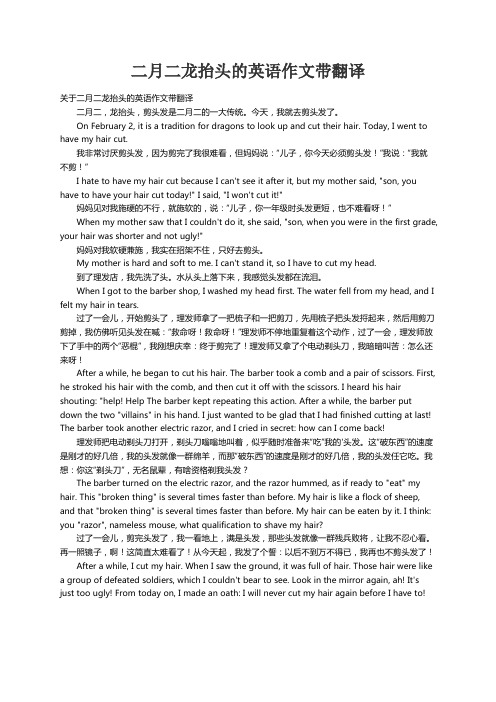
二月二龙抬头的英语作文带翻译关于二月二龙抬头的英语作文带翻译二月二,龙抬头,剪头发是二月二的一大传统。
今天,我就去剪头发了。
On February 2, it is a tradition for dragons to look up and cut their hair. Today, I went to have my hair cut.我非常讨厌剪头发,因为剪完了我很难看,但妈妈说:“儿子,你今天必须剪头发!”我说:“我就不剪!”I hate to have my hair cut because I can't see it after it, but my mother said, "son, you have to have your hair cut today!" I said, "I won't cut it!"妈妈见对我施硬的不行,就施软的,说:“儿子,你一年级时头发更短,也不难看呀!”When my mother saw that I couldn't do it, she said, "son, when you were in the first grade, your hair was shorter and not ugly!"妈妈对我软硬兼施,我实在招架不住,只好去剪头。
My mother is hard and soft to me. I can't stand it, so I have to cut my head.到了理发店,我先洗了头。
水从头上落下来,我感觉头发都在流泪。
When I got to the barber shop, I washed my head first. The water fell from my head, and I felt my hair in tears.过了一会儿,开始剪头了,理发师拿了一把梳子和一把剪刀,先用梳子把头发捋起来,然后用剪刀剪掉,我仿佛听见头发在喊:“救命呀!救命呀!”理发师不停地重复着这个动作,过了一会,理发师放下了手中的两个“恶棍”,我刚想庆幸:终于剪完了!理发师又拿了个电动剃头刀,我暗暗叫苦:怎么还来呀!After a while, he began to cut his hair. The barber took a comb and a pair of scissors. First, he stroked his hair with the comb, and then cut it off with the scissors. I heard his hair shouting: "help! Help The barber kept repeating this action. After a while, the barber put down the two "villains" in his hand. I just wanted to be glad that I had finished cutting at last! The barber took another electric razor, and I cried in secret: how can I come back!理发师把电动剃头刀打开,剃头刀嗡嗡地叫着,似乎随时准备来“吃”我的'头发。
- 1、下载文档前请自行甄别文档内容的完整性,平台不提供额外的编辑、内容补充、找答案等附加服务。
- 2、"仅部分预览"的文档,不可在线预览部分如存在完整性等问题,可反馈申请退款(可完整预览的文档不适用该条件!)。
- 3、如文档侵犯您的权益,请联系客服反馈,我们会尽快为您处理(人工客服工作时间:9:00-18:30)。
The Double-Second Festival二月二The Double-Second Festival (or the Spring Dragon Festival) is traditionally named the Dragon Head Festival, which is also called “the Day of Legendary Birth of Flowers”, “the Spring Outing Day”, or “the Vegetables-Picking Day”. It came into existence in the Tang Dynasty (618AD --- 907 AD). The poet, Bai Juyi wrote a poem entitled The Second Day of the Second Lunar Month:” The first rain stops, sprout grass and vegetables. In light clothes are young lads, and in lines as they cross the streets.” On this special day, people send gifts to each other, pick vegetable, welcome wealth and go on a spring outing, etc. After the Ming Dynasty (1368 AD --- 1644 AD), the custom of spreading ashes to attract a dragon was called “dragon lifting its head”.二月二,又称“花朝节”、“踏青节”、“挑菜节”,俗称“龙抬头日”。
大约在唐代就已形成。
白居易有《二月二日》诗:“二月二日新雨晴,草芽菜甲一时生。
轻衫细马春年少,十字津头一字行。
”在这一天,民间相互送礼,还有挑菜、迎富、踏青等活动。
明代以后,又有撒灰引龙的习俗,称为“龙抬头”。
Why is it called “dragon lifting its head”? There is a folktale in northern China.为什么叫“龙抬头”呢?北方民间有这么一个传说。
It is said that once the Jade Emperor ordered the four Sea Dragon Kings not to rain on the earth in three years’ time. At a time, life for the people was intolerable and the people suffered untold misery and hardship. One of the four Dragon Kings --- the jade dragon was sympathetic with the people and secretly dropped a soaking rain on the earth, which was soon discovered by the Jade Emperor, who banished him to the mortal world and put him under a huge mountain. On it was a tablet, which said the jade dragon would not go back to Heaven unless golden beans blossomed.说是有一年,玉帝传谕四海龙王,三年内不得向人间降雨,一时间民不聊生,百姓苦不堪言。
有一条玉龙不忍心了,就私自向人间下了一场透雨。
这事很快就被玉帝发觉,便把玉龙打下凡间,压在一座大山下受罪。
山上立了块碑,说是除非金豆开花,玉龙才能重新上天。
People went around telling the news and were thinking of ways to save the dragon. One day, an old woman carried a sack of corn for sale on the street. The sack opened and the golden corn for scattered on the ground. It occurred to people that seeds of corn were the gold beans, whichwould blossom if they were roasted. Therefore, people coordinated their efforts to roast popcorn and place it in the yards on the second day of the second lunar month. The God Venus had dim eyesight with old age. He was under the impression that golden beans blossomed, so he released the dragon.老百姓知道了,奔走相告,大家都在想办法要拯救玉龙。
一天,一个老婆婆背了一袋玉米,上街去卖,不小心袋口松开,金黄金黄的玉米籽撒了满地。
人们心头一亮,心想,玉米籽不就是金豆吗,炒炒不就开花了吗?于是大家齐心协力,约定在二月二这天,家家炒玉米花,放在庭院里,太白金星人老眼花,一看,果然是金豆开花了,就把玉龙给放了出来。
From then on there was a custom on the earth that on the second day of the second lunar month, every family would roast popcorn. Some people sang while roasting:”The dragon lifts its head on the second day of the second lunar month. Large barns will be full and small ones will overflow.”从此以后,民间便有了这个风俗,每年二月二这天,家家户户都要炒玉米花。
有的还边炒边唱:“二月二,龙抬头,大仓满,小仓流。
”While the Hani ethnic group inhabiting in Mount Ailao on the southern bank of the Red River referred to third day as the Day of Worshipping Dragons, with a moving folktale of two brave young men slaughtering a demon.聚居在红河南岸哀牢山中的哈尼族,则把二月二当做“祭龙日”,这一带民间传颂着两个勇敢的小伙子诛杀恶魔,为百姓除害的动人故事。
The festival is also know as the Day of the Legendary Birth of Flowers, which falls on the 12th or 15th of the second lunar month in some other places. Since spring is round the corner and all flowers will soon be in bloom, the day is set as the birthday of the Flower God, which is believed to be in spring. It later gets an elegant name of the Day of the Legendary Birth of Flowers from men of letters.人们又把二月二叫做花朝节。
也有些地方把二月十二,或是二月十五叫做花朝节的。
总之,意思是说春天快要到了,百花又要争相开放了。
人们以为掌管百花的花神应该是有生日的,她的生日就应该在春天,如果就把某一天定做“百花生日”。
民间说是百花生日,在了文人嘴里,说得雅一些,就成了花朝节。
A series of activities are held on this day, including appreciating flowers, growing flowers, going to a spring outing, and attaching red straps to branches. Sacrifices are offered to the Flower God at Flower God Temples in many places. Red straps of paper or cloth are tied to the stems of flowers. The weather that day is seen as the divination of a year’s yield of wheat, flowers and fruits.这一天,往往有赏花、种花、踏青和赏红等一系列活动。
旧时,在许多地方都还有花神庙,于是就要在这一天祭祀花神。
人们用红的纸带、布条系在花枝上,称为“赏红”,还有以这一天的阴晴来占卜全年小麦,花果丰歉的俗信。
People of the Zhuang ethnic group name it the Day of Hundred-Flower Fairy. Youngsters will gather around a dam with bombax trees, singing a musical dialogue in antiphonal style, throwing embroidered balls to their loves and exchanging gifts. They will sing songs worshipping the Hundred-Flower Fairy. The embroidered balls they get will be hung on the bombax trees, where the Hundred0Flower Fairy is believed to live in. In this way, the Hundred-Flower Fairy will bless them with pure and sweet love forever.壮族同胞把二月二叫做“百花仙子节”,每年这天,男女青年都要聚集在长有木棉树的平坝对歌。
